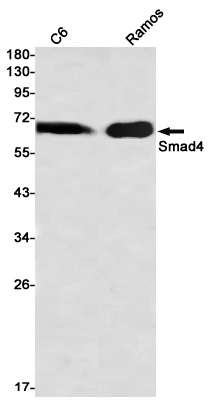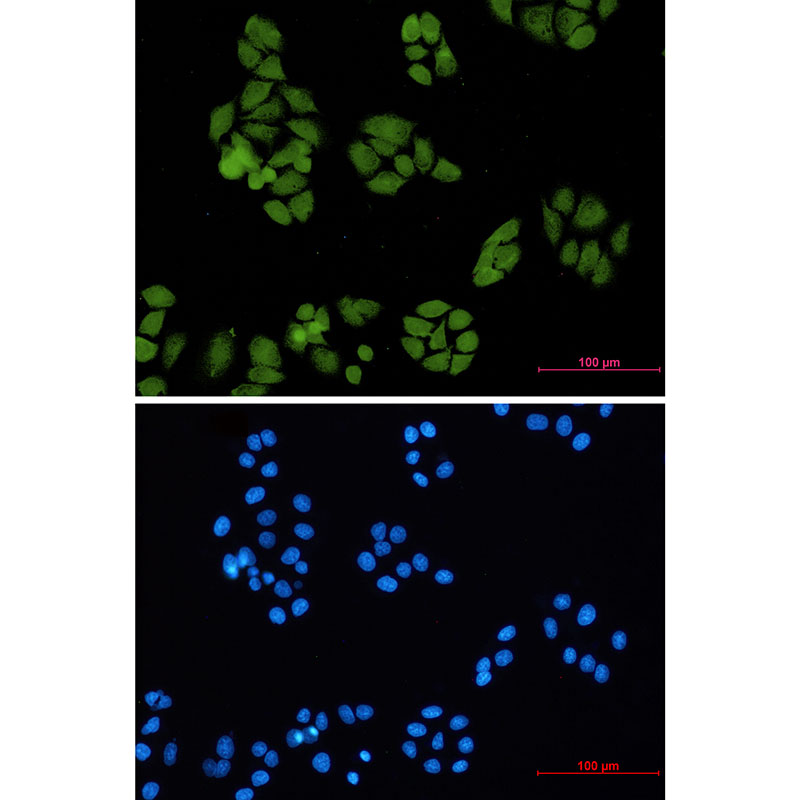

| WB | 1/500-1/1000 | Human,Mouse,Rat |
| IF | 1/20 | Human,Mouse,Rat |
| IHC | 咨询技术 | Human,Mouse,Rat |
| ICC | 1/50-1/200 | Human,Mouse,Rat |
| FCM | 咨询技术 | Human,Mouse,Rat |
| Elisa | 咨询技术 | Human,Mouse,Rat |
| Aliases | SMAD4; DPC4; MADH4; Mothers against decapentaplegic homolog 4; MAD homolog 4; Mothers against DPP homolog 4; Deletion target in pancreatic carcinoma 4; SMAD family member 4; SMAD 4; Smad4; hSMAD4 |
| Entrez GeneID | 4089 |
| WB Predicted band size | Calculated MW: 60 kDa; Observed MW: 70 kDa |
| Host/Isotype | Rabbit IgG |
| Antibody Type | Primary antibody |
| Storage | Store at 4°C short term. Aliquot and store at -20°C long term. Avoid freeze/thaw cycles. |
| Species Reactivity | Human,Rat |
| Immunogen | A synthetic peptide of human Smad4 |
| Formulation | Purified antibody in TBS with 0.05% sodium azide,0.05%BSA and 50% glycerol. |
+ +
以下是关于Smad4抗体的3篇参考文献示例,包含文献名称、作者及摘要概括:
---
1. **文献名称**:*"Development and Validation of a Smad4-Specific Monoclonal Antibody for Immunohistochemical Analysis in Pancreatic Cancer"*
**作者**:Chen L, et al.
**摘要**:该研究开发了一种高特异性的Smad4单克隆抗体,用于检测胰腺癌组织中的Smad4蛋白表达。通过Western blot和免疫组化验证,证明该抗体能有效区分Smad4阳性与缺失的肿瘤样本,为胰腺癌分子分型提供了可靠工具。
---
2. **文献名称**:*"Smad4 Nuclear Localization Dynamics in TGF-β Signaling Revealed by a Novel Polyclonal Antibody"*
**作者**:Zhang Y, et al.
**摘要**:研究团队制备了一种新型Smad4多克隆抗体,结合免疫荧光技术揭示了TGF-β刺激下Smad4从胞质向核内转位的动态过程,验证了其在细胞信号转导机制研究中的应用价值。
---
3. **文献名称**:*"Loss of Smad4 Expression in Colorectal Cancer: Comparative Analysis Using Commercial Antibodies and Clinical Prognostic Implications"*
**作者**:Tanaka K, et al.
**摘要**:通过对比三种市售Smad4抗体的敏感性和特异性,该研究确定了最优抗体用于结直肠癌组织检测,并发现Smad4表达缺失与患者预后不良显著相关,为临床病理诊断提供了依据。
---
以上文献示例聚焦于抗体开发、信号机制研究和临床诊断应用,涵盖不同研究场景下的Smad4抗体用途。
Smad4. a critical mediator of the transforming growth factor-beta (TGF-β) signaling pathway, plays a central role in regulating cellular processes such as proliferation, differentiation, apoptosis, and immune responses. As a tumor suppressor, Smad4 forms complexes with receptor-activated Smads (Smad2/3) to translocate into the nucleus, where it modulates the transcription of target genes. Dysregulation or mutations in Smad4 are closely associated with various cancers, including pancreatic, colorectal, and gastric cancers, as well as hereditary hemorrhagic telangiectasia (HHT).
Smad4 antibodies are essential tools for studying TGF-β signaling dynamics and disease mechanisms. These antibodies are widely used in techniques like Western blotting, immunohistochemistry (IHC), immunofluorescence (IF), and co-immunoprecipitation (Co-IP) to detect Smad4 expression, localization, and protein interactions. Researchers rely on Smad4-specific antibodies to investigate its role in epithelial-mesenchymal transition (EMT), tumor progression, and therapeutic resistance. Validated antibodies often undergo rigorous testing for specificity using knockout cell lines or siRNA-mediated knockdown.
In clinical contexts, Smad4 antibody-based assays help correlate protein expression patterns with cancer prognosis or treatment responses. Recent studies also explore Smad4's involvement in non-canonical pathways and stromal cell communication. However, antibody performance may vary depending on epitope accessibility, post-translational modifications, or tissue fixation methods, necessitating careful validation for experimental reproducibility.
×